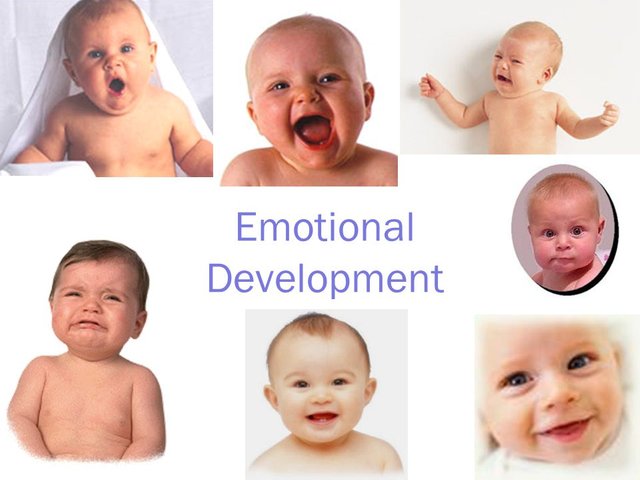PSYCHOLOGY (CHILD DEVELOPMENT) - EMOTIONAL DEVELOPMENT

SOURCE http://slideplayer.com/slide/1385062/
Emotion is a feeling experienced by an individual which usually give rise to state of disequilibrium. Emotion is derived from a Latin word "emovere", which means stir up, agitate, excite or move. Hence emotion is a state of excitement or agitation.
ARE EMOTIONS INBORN OR LEARNED?
William James, a renowned psychologist is one of those who claim that emotional responses are instinctive (that is, they are inborn ). According to him, the feelings, sensation and behaviors appropriate to emotions were inborn reactions to particular stimuli. For example, fear was supposedly an inborn reaction to certain noise, strange animals etc. In an experimental tests, James list of fear - provoking stimuli was experimented upon by J.B Watson. Babies four to six months old were shown a black cat, a pigeon, a rabbit, a rat and a large dog - all strange animals. The infants displayed a total lack of emotional reactions. They also revealed no fear of fire, high place or of darkness. the children rather showed definite fearful reactions to other stimuli, namely, loud sounds, pain and loss of support. Through extensive experiments with children of varying ages using similar stimuli, it was shown that fear responses reported by William James were acquired and not instinctive. Emotion are therefore learned.
PHYSIOLOGICAL RESPONSES IN EMOTION
During the experience of emotion, there are certain changes that occur in the body of individual. For example, there is increase in blood pressure, the heart beats faster, the hairs erect and "goose flesh" occur. There is perspiration - cold sweat, digestive movements of the stomach and intestine stop. Blood is rather diverted from the stomach and intestines and sent to the brain and muscles. The throat and the mouth go dry as the salivary glands are inhabited. One of the ductless glands - adrenaline gland, secrets the hormone called adrenalin into the blood stream which has several effects like speeding up the heart beat, making the liver to release excess sugar into the blood stream for muscular energy, increase in the ability of blood clot.
ANATOMY OF EMOTION
Research has confirmed the idea that there is one basic emotion and that is "excitement". That is to say that emotion is not a state of calmness but excitement. Again, it has been found that the brain controls the inner organs through two sets of the nerves- namely: SYMPATHETIC NERVES and the PARASYMPATHETIC NERVES.
The sympathetic nerves runs the body on an emergency basis while the parasympathetic keeps the body body in normal running order. The parasympathetic nerves carries out all the vital function of body such as:
- Protection of the eyes : It protect the eyes from the bright light by contracting the pupil
- Digestion of food : it controls digestion ensuring its passage along the alimentary canal.
- excretion : it ensures the elimination of waste product from the body etc.
The sympathetic nerves are the standby 'trouble-shooter' that takes charge in a real emergency. That is, when there is emergency situation, it operates. It takes over under the following conditions namely :
- when life is threatened by extreme cold.
- during continuous pain.
- During fear and rage etc.
It is responsible for increasing the heart beat during emergency and secrets hormones such as adrenalin
STAY TURNED AS I WILL BE DISCUSSING STAGES OF EMOTIONAL DEVELOPMENT NEXT TIME OUT !!!
UPVOTE , FOLLOW AND RESTEEM..... @simplicitytech
I believe emotions are inborn and not learnt bro
Voted!
I once believed that.. according to findings, it is not so.